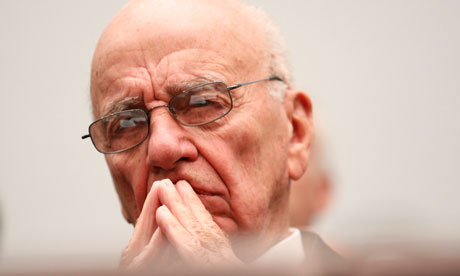Phone hacking: Can Rupert Murdoch put out the fire?
With the police inquiry into phone hacking reopened, Rupert Murdoch has left Davos for Wapping. He faces a difficult task

As the truly incredible phone-hacking scandal unravels yet further, Rupert Murdoch has forfeited fondue and self-congratulation at Davos in favour of a trip to the Wapping office. In recent years Murdoch has delegated matters outside the US to his son James, but his swift and unplanned detour carries with it the implication that there is more here than the usual awkward dynamic of a parental visit.
The implication it is tempting to draw is that Murdoch thinks the situation is out of control and his very presence suggests a lack of faith in James's ability to sort it out. A more plausible scenario is that the scandal involves two things of which James Murdoch knows little and cares for less: journalism and mollifying regulators.
Murdoch has to tame the generation of editors that includes senior executive Rebekah Brooks and Andy Coulson. Coulson has now both resigned as a newspaper editor and as the government's head of communications over a set of illegal practices in his newsroom he says he was completely ignorant of. As the power of News International grew throughout the 90s, the talented young editors found themselves in positions of ridiculous power and astonishing wealth. Tellingly, perhaps, they also became part of a social set, outside the workplace, with the younger Murdochs. This feeling of faux family has sometimes perhaps stayed the sword where previously it would have been wielded without a second thought.
Boundaries in the newsroom were not sufficiently drawn, or, worse, not drawn at all because there was seemingly no accountability. Not from the top of the company, or from the politicians and regulators. Journalists became friendly with the establishment they reported, to an extent that would make Kelvin MacKenzie spin in his grave, if he were dead.
Rupert Murdoch isn't known for allowing egregious errors in his staff go unpunished, but he has had his eye off the newspaper ball in the UK for quite some time, certainly since buying the Wall Street Journal in the US in 2007.
Now the mess of the phone hacking threatens something that is extremely important to Murdoch: his business interests. It threatens to scuttle the buy-back of BSkyB shares, currently being scrutinised (although that is rather a strong word) by Jeremy Hunt, and although the story has not exactly been front-page news in every paper in the US, the hacking case certainly has the potential to dent Murdoch's reputation in his most important territory.
So far Rupert Murdoch has been kept remote from the unfolding saga. Now he has put himself at the centre of it. Whether he can control it is an open question.

